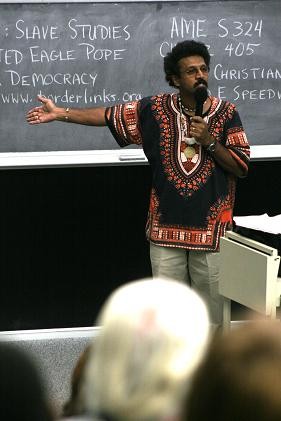African-American studies professor Julian Kunnie gave an impassioned speech about the “”assault on Mother Earth”” last night in the Aerospace and Mechanical Engineering auditorium, as part of the discussion “”New Orleans Hurricanes Race, Class, and Poverty.””
About 40 people attended the discussion, which was sponsored by Voices of Opposition and broken into segments of two documentaries about the devastating effects Hurricane Katrina had on New Orleans in August 2005.
The first documentary, “”I Won’t Drown on That Levee and You Ain’t Gonna’ Break My Back,”” discussed the mistreatment and abandonment of inmates at the Orleans Parish Prison during Katrina. The second film, “”Welcome to New Orleans,”” looked at violence and racism one year after the hurricane.
“”It’s important to understand that much of what we see in New Orleans, and around the world, has to do precisely with the violation of Mother Earth,”” Kunnie said. “”The obsession with possessing power has sewn the seeds of our own destruction, as we see with the recent fires in California.””
In the midst of wild hand gestures and even some shouting, Kunnie discussed current problems in the United States ranging from capitalism and Guantanamo Bay, to global warming in the Arctic Circle and the wrongful imprisonment of blacks across the country.
“”Africans have been made refugees in their own land,”” Kunnie said. “”It’s this complete disregard that has made our country the most violent place on Mother Earth.””
In August, Kunnie spent a week in New Orleans to commemorate the second anniversary of Katrina – or “”Hurricane America,”” as he called it – to hear testimonies from blacks still living there.
“”There used to be 500,000 living in the city,”” Kunnie said. “”Thanks to the Bush administration, 250,000 people, mostly black and poor, have been refused entry to return to their homes.””
Amy Strand, a journalism senior, was among the audience, which was composed largely of older local residents.
“”It’s interesting how they tie race into all of it, because you always here about Hurricane Katrina in relation to poverty, but not race,”” she said.
Liem Le, a math education junior, attended the discussion after a UA professor showed the Spike Lee documentary “”When the Levees Broke”” in one of his classes, and it sparked his interest.
“”I sympathize with the situation in New Orleans, but I haven’t been keeping up to date with the current situation there, and I thought this would help me touch base,”” Le said. “”I think to really help, people need to educate themselves about the whole situation, including FEMA’s response and why Hurricane Katrina is getting a different response than the fires in California.””
Last night’s discussion was part of Voices of Opposition’s Monday night film series, which will continue throughout November. A schedule is available at www.voicesofopposition.com.









